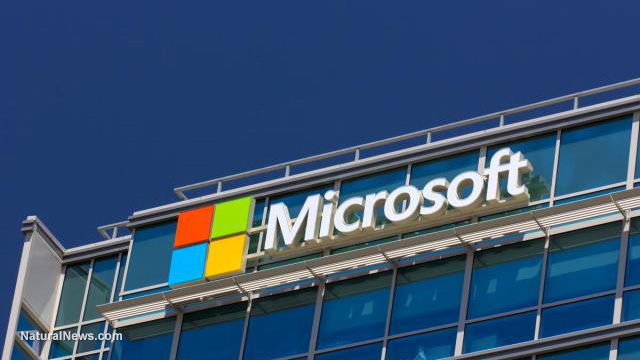Microsoft thinks it can 'solve' cancer without ever addressing the causes of the disease
Tuesday, September 27, 2016 by: J. D. Heyes
Tags: Microsoft, cancer, biochemistry

(NaturalNews) Computer giant Microsoft recently made the bold claim that within a decade its scientists will "solve the problem of cancer" through the revolutionary use of computer science techniques that ostensibly will allow researchers to break the code of cancerous cells and reprogram them to be healthy once more.
The only problem is that Microsoft isn't really addressing the root causes of the disease in the process, and is instead implementing an after the fact "solution." More on that in a moment.
In what many see as a major shift in direction for the technology titan, Microsoft claims that it has put together a "small army" of the world's foremost programmers, engineers and biologists who will look at cancer like it was a bug in a computer system.
Over the summer, the company opened its first wet lab where it plans to test findings of researchers who are working on big maps that lay out the internal operations of networks of cells, the UK's Telegraph reported.
In addition, researchers are also developing a computer actually made from DNA that could exist within cells, and whose job would be to look for defects like cancer in body functions and internal networks. If it determines that cancerous conditions exist, it will essentially reboot the network system to clear out diseased cells.
Reprogramming cells may have potential, but it's only half the issue
"I think it's a very natural thing for Microsoft to be looking at because we have tremendous expertise in computer science and what is going on in cancer is a computational problem," said Microsoft research lab director Chris Bishop.He added that it wasn't simply an analogy but rather "deep mathematical insight." He admitted that computing and biology might seem like "chalk and cheese" to most people, but in reality they have much in common "on the most fundamental level."
The group of biological computer experts gathered at Microsoft Research are in the process of building molecular computers from DNA that work like a physician to locate, then destroy, cancer cells. The leader of the group, Andrew Philips, described the project as "long-term," but believes that technically, what they are attempting to accomplish is feasible in five to 10 years time.
To be sure, the project is ambitious. Already, the research group has developed software that copies a cell's healthy behavior so that it can be contrasted with the behavior of a diseased cell in order to help figure out where a problem lies and how to address it. This tool, called a Bio Model Analyser, is already in use assisting researchers in the understanding of how to better treat leukemia.
Dr. Jasmin Fisher, an associate professor and senior researcher at Cambridge University in Cambridge, England, told the Telegraph that if it's possible to regulate and control cancer, then it is more likely that "any chronic disease" could also be dealt with using the same techniques, thus solving a host of medical problems.
"I think for some of the cancers five years, but definitely within a decade. Then we will probably have a century free of cancer," she said.
To really solve the problem of cancer, nutrition needs to be a part of the equation
But again, this approach, while novel and potentially successful, misses a big part of the problem. A goal of any research effort ought to include ways to prevent cancers from developing in the first place. And that will require dismissing old, disproven medical "treatments" like chemotherapy which result in a 50-percent death rate, and embracing new ideas like promoting better nutrition, as Natural News founder Mike Adams, the Health Ranger and author of the book, Food Forensics, has long advocated.In a recent interview with cancer researcher Ty Bollinger, Adams said:
"The modern mainstream medical community ... think that your body is somehow disconnected from what you feed your body, which is astonishing, completely irrational, illogical, unscientific."
Both he and Bollinger noted that medical doctors, some with more than a dozen years of education and training, have only a few hours' worth of instruction pertaining to nutrition, and even then it is not aimed at how better nutrition can serve as a defense against cancer and other diseases.
Watch the short interview here.
Sources:
Telegraph.co.uk
YouTube.com
NaturalNews.com
Science.NaturalNews.com
Microsoft at FETCH.news
Get independent news alerts on natural cures, food lab tests, cannabis medicine, science, robotics, drones, privacy and more.
Take Action: Support Natural News by linking to this article from your website
Permalink to this article:
Embed article link: (copy HTML code below):
Reprinting this article:
Non-commercial use OK, cite NaturalNews.com with clickable link.
Follow Natural News on Facebook, Twitter, Google Plus, and Pinterest
- New study links mRNA vaccines to GENETIC CHANGES - and not the good kind
- Fauci is back in the limelight, and he’s busy promoting a future COVID or FLU pandemic
- Tulsi Gabbard leads charge against the Biden regime’s global censorship of the 'Disinformation Dozen'
- A comprehensive guide to DANDELIONS, an ancient herbal medicine and superfood
- Aerosolized bioweapons? Strange “diploid biomasses” falling out of the sky in Florida captured under the microscope
- How Israeli military-connected corporations are secretly controlling your online privacy
- DEADLY FLU JAB WARNING: New flu vaccines make recipients 27 PERCENT MORE LIKELY to catch the flu
- Idaho Gov. Brad Little signs Medical Freedom Act banning vaccine mandates
- Analysis: The coming economic collapse, a mass uprising and Trump's three secret weapons to halt the growing revolt
- Kiss Your Genetic Privacy Good-Bye! 23andMe Gets Green Light to Sell Your Intimate Genetic Details to Anyone They Want
- DEATH BY DOCTOR: Why and how doctors are now PAID TO KILL their patients
- U.S. lawmakers investigate Meta over alleged China collaboration
- Tulsi Gabbard takes aim at censorship: Justice for the ‘Disinformation Dozen’
- Widespread social and economic unrest: Steve Quayle issues urgent financial warning of imminent asset collapse in new interview with Mike Adams
- CIA Official Terry Adirim TERMINATED for her role in pushing unlawful vaccine mandates on the military
- Trump’s EPA reviews fluoride safety amid growing concerns over risks to children’s health
- Mike Adams releases country western hit single: Goin’ Back in Time is Comin’ Home
- Curcumin’s ancient healing power supercharges muscle recovery, and its effects are compounded with anti-inflammatory foods and supplements
- Aerosolized bioweapons? Strange “diploid biomasses” falling out of the sky in Florida captured under the microscope
- Analysis: The coming economic collapse, a mass uprising and Trump's three secret weapons to halt the growing revolt
- Kiss Your Genetic Privacy Good-Bye! 23andMe Gets Green Light to Sell Your Intimate Genetic Details to Anyone They Want
- Widespread social and economic unrest: Steve Quayle issues urgent financial warning of imminent asset collapse in new interview with Mike Adams
- Defunding DEADLY mRNA jabs: Government funding for mRNA technology being scrutinized and sidelined until proven "safe and effective" for real
- CLOT SHOT PLANDEMIC UNFOLDING: Fibrous, rubbery clots caused by covid injections have prion-like seeding activity
- European Court of Justice: Healthcare professionals who promoted or administered COVID-19 vaccines are CRIMINALLY LIABLE for any harm caused
- Mike Adams releases country western hit single: Goin’ Back in Time is Comin’ Home
- DEATH by VACCINE or face PRISON time: Canadian Freedom Convoy leaders CONVICTED for protesting forced vaccination during the Covid Plandemic
- Newly released JFK files reveal Pentagon's role in creating Lyme disease and covid in the same lab
- “Project Aldrin”: Senate probes Meta's alleged censorship dealings with China
- How Israeli military-connected corporations are secretly controlling your online privacy
- The hidden war above: Chemtrails, HAARP and the battle for planetary control
- Federal employees whine over DOGE's new directive requiring them to do a 5-point summary of weekly accomplishments
- FBI imposed gag order on agents to silence Hunter Biden laptop truth before 2020 election, new chat logs reveal
- Tulsi Gabbard leads charge against the Biden regime’s global censorship of the 'Disinformation Dozen'
- U.S. approves new Russian ambassador as diplomatic thaw continues
- I Want My Bailout Money – new song released by Mike Adams
- Newly released JFK files reveal Pentagon's role in creating Lyme disease and covid in the same lab
- Mike Adams releases country western hit single: Goin’ Back in Time is Comin’ Home
- Dr. Mike Yeadon releases 15-minute testimony - WATCH - about genocidal intent of COVID “vaccines”
- The Health Ranger releases “Vaccine Zombie” song and music video, using AI-animated zombies for the music video
- California's social media censorship law struck down: A victory for free speech or a threat to online safety?
- EPA advisor admits the agency is funneling billions to climate groups ahead of Trump’s return to White House
- Rep. Nancy Mace introduces bill to ban biological males from female facilities on federal property
- OpenAI whistleblower who dissented against how the company trained ChatGPT found dead
- Survival 101: Effective EMF blocking techniques
- Analysis: The coming economic collapse, a mass uprising and Trump's three secret weapons to halt the growing revolt
- MEDICAL BOMBSHELL: FDA admits Covid mRNA 'Vaccines' CAUSE CANCER
- CONSERVATIVES SOUND THE ALARM: Big Pharma and the Left trying to force $32 billion money grab from America’s seniors into year-end spending deal
- Florida takes a stand: DeSantis proposes permanent ban on mRNA vaccine mandates
- Sugarcane extract superior to cholesterol-lowering drugs?
- Pilots report mysterious lights 'moving at extreme speeds' across Oregon skies
- Trump reverses course on Gaza plan, says “nobody is expelling Palestinians”
- 5 Simple steps to boost your brainpower: How to strengthen executive function in a distracted world
- Trump Administration cuts 2,000 USAID jobs, places most employees on leave in sweeping reform effort
- Red Cross issues warning to stop blood plasma donations from vaccinated people
- Scientists confirm: GENIUS brain function can be spontaneously unleashed in humans without any apparent cause
- EPA advisor admits the agency is funneling billions to climate groups ahead of Trump’s return to White House
- HYSSOP: What research reveals about the health benefits of this ancient holy herb
- Two containers with completed ballots fall out of truck in Florida
- Fully vaccinated about to see “tsunami” of illness and death, warns virologist
- Global leaders unite to clamp down on “misinformation” with UN-backed Cascais Declaration
- Newly released JFK files reveal Pentagon's role in creating Lyme disease and covid in the same lab
- BREAKING: 2025 NDAA authorizes mandatory military draft of WOMEN across America… as Pentagon pursues global NUCLEAR war with both Russia and China at the same time
- Michael Yon warns of a ZIONIST TAKEOVER in Trump’s second administration
- Ozempic and Wegovy weight loss drugs are injectable LIZARD VENOM PEPTIDES that may unleash a devastating wave of organ failure… side effects align with symptoms of SNAKE BITES
- The Health Ranger releases “Vaccine Zombie” song and music video, using AI-animated zombies for the music video
- BOMBSHELL: DNA testing kits are a SCAM to develop ethnic-specific bioweapons
- Israeli soldiers accused of even more torture and abuse in the West Bank
- These 13 countries just signed an agreement to engineer a global FAMINE by destroying food supply
- NASA admits that climate change occurs because of changes in Earth’s solar orbit, and NOT because of SUVs and fossil fuels
- RFK Jr. clears key hurdle: Sen. Susan Collins backs controversial HHS nominee, signaling a new era for health policy
- Sermon 30: How Jesus reveals Caesar’s FAKE CURRENCY and FALSE AUTHORITY
Science News & Studies
Medicine News and Information
Food News & Studies
Health News & Studies
Herbs News & Information
Pollution News & Studies
Cancer News & Studies
Climate News & Studies
Survival News & Information
Gear News & Information
News covering technology, stocks, hackers, and more



"Big Tech and mainstream media are constantly trying to silence the independent voices that dare to bring you the truth about toxic food ingredients, dangerous medications and the failed, fraudulent science of the profit-driven medical establishment.
Email is one of the best ways to make sure you stay informed, without the censorship of the tech giants (Google, Apple, Facebook, Twitter, YouTube, etc.). Stay informed and you'll even likely learn information that may help save your own life."
–The Health Ranger, Mike Adams












































